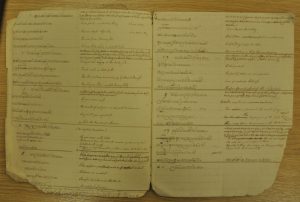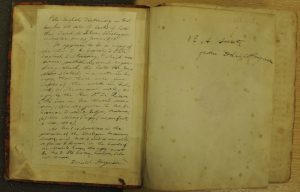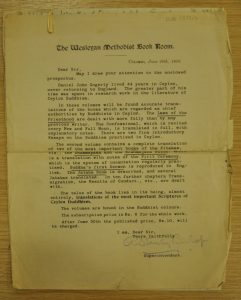Daniel John Gogerly (1792-1862) – Early Pali Scholar
We are very grateful for the many volunteers who give of their time to help with our Collections. Recently Ginte Serenaite spent several months with us working on the Papers of Daniel John Gogerly. Ginte sorted through all the Papers, cleaning, repackaging and listing them ready for cataloguing. We benefited from her expertise in Buddhist literature in that she was able to document each of the items accurately. The catalogue of all her hard work is available on Archives Hub along with our other archival material that is currently catalogued.
But who was Daniel John Gogerly and why do we have some of his Papers in our archives? In the Minutes of the Proceedings of the Forty-First Anniversary Meeting of the RAS held on 30th May, 1864, there is a tribute to Gogerly. He had been a Corresponding Member of this Society and an active member of the then Ceylon Branch of the Royal Asiatic Society, including being its Secretary, Vice-President and President, but had died in Colombo in 1862. According to this tribute Gogerly was born in London in 1792. He trained for the ministry and in 1818 went to Ceylon (currently Sri Lanka) to take charge of the Wesleyan Mission Press at Colombo.
Gogerly began to study the local languages and was one of the first missionaries to preach extemporaneously in Singhalese. He moved to Negembo in 1822 and began to study Pali. This language had been brought to the attention of western language scholars by Eugène Burnouf and Christian Lassen. He remained in Negembo until 1834, when he was transferred to Mathura. This, we are told, proved to be a good move for his Pali studies as the priests of the district were considered to be the most learned scholars on the island.
Gogerly employed native pandits to make copies of all the sacred books, parts of which were found in the temples and he thus succeeded in collecting a complete set of the Pitakattayam, which he left as a legacy to the Wesleyan Mission. Apparently Gogerly was urged to publish work on the southern branch of Buddhism but, it seems, he was reluctant or lacked confidence to do so. However he did contribute to the Journal of the Ceylon Branch of the RAS. His contributions included extracts from the Vinaya, translation of the Brahmajālasutta and Subhasutta, portions of the Jãtaka, the Dhammapada and the Pãtimokkha. He also wrote an article entitled “Notes on Buddhism” which was included in a new translation of Riberyo’s “History of Ceylon” and aided Sir Emerson Tennant in preparing a work on Ceylon.

Gogerly also undertook a revision of the Singhalese version of the Bible. In the RAS tribute to his life, however, his greatest literary performance was considered to be, in manuscript form, a Dictionary of the Pali language which he had continued to add to throughout his time in Sri Lanka, accruing 15000 words.

For scholars of Pali, you will be pleased to hear that this MS is amongst the Papers of Daniel John Gogerly held here at the RAS. Indeed, there are three versions of this manuscript. There are also many of his translations in manuscript form. Please look at the list on Archives Hub to see the extent of the translations that we hold. The Papers also contain some later correspondence. There is a letter from the Reverend R. Spence Hardy informing the RAS of the death of Gogerly. Hardy is quoted within the Anniversary Report, saying, about Gogerly: “In him oriental literature lost one of its most successful students, and the island of Ceylon one of its greatest benefactors.”

There is also correspondence between Edmund Rowland Jayathilake Gooneratne, the Reverend Arthur Stanley Bishop, Thomas William Rhys Davids (founder of the Pali Text Society) and Charlotte Hughes (Secretary of the RAS) concerning the posthumous publication of Gogerly’s work. Bishop became the editor for Gogerly’s collected works which were published in 1908. We also hold a copy of this book in our Collections.

Gogerly is less well known than others in Pali studies but he was one of its pioneers. And we are pleased that much of his work is within the archives in its manuscript form. We also have Personal Papers of other Pali scholars including George Edward Fryer and Richard Morris. These are still waiting to be catalogued so if you fancy the challenge, do please get in contact…
